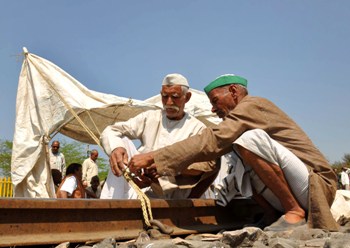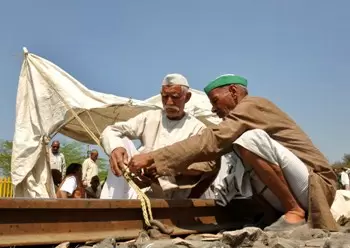Should reservations continue forever?
17-January-2014

It is indeed shameful that even after 66 years of independence, a large majority of Scheduled Caste (SC), Scheduled Tribe (ST) and Other Backward Classes (OBC) people live in pathetic conditions, at the mercy of others.
This is because only the upper echelons of these groups (a small percentage) are enjoying the provisions of reservation while the majority, the poorest of the poor, working as labourers, remain labourers for generations because of lacunae in reservation, defeating the very purpose of constitutional reservations.
 |
|
An agitation by Jats in UP to press for their reservation demands in government jobs couple of years ago (Photo: Indian Photo Agency)
|
When the condition and circumstances for children of the upper echelons among SC, ST and minorities are on a par with the majority of forward caste children, why should they need reservation in education and employment?
The former category includes Class I government officers and above and private sector employees with over Rs.6 lakh in income per annum besides elected representatives.
In the process, these privileged sections within the SC and ST are knowingly or unknowingly depriving the privileges meant for children of the downtrodden from these groups.
If reservation is removed for the upper echelons of SC, ST and minorities, lakhs of downtrodden children can get opportunities to become engineers, doctors and other professionals. So, political parties should pledge to enact a law scrapping reservations for upper echelons among Dalits, tribals and OBCs.
And if political parties are indeed genuine, they should immediately provide proportionate representation in their own ranks, from the village to national level, to SC, ST and minorities based on the percentage of population in order to empower them. This is vital as party organisations prepare the agendas of the government.
The upper echelons among Dalits, tribals and minorities should also be barred from contesting elections from reserved constituencies -- at all levels up to parliament.
Individuals whose annual family income and assets are above Rs.3 lakh at the village level, Rs.10 lakh at the block level, Rs.50 lakh at the state level and double that at the parliamentary level must be treated as upper echelon. As the really wealthy Dalit, tribal and OBCs can enjoy facilities on a par with forward caste candidates, they should contest in the general category seats.
It should also be the moral responsibility of the educated SC, ST and OBC who have gained from reservation in education, employment and electoral system to contribute a fraction of their annual income to a fund to ensure better educational conditions for meritorious students and to provide seed capital for deserving self employment opportunities (to be monitored by experts).
In addition, all those from SC, ST and OBCs employed with sectors such as banking and revenue departments should spend a month in villages auditing government welfare schemes. After all, these measures are meant for the betterment of the downtrodden.
All these measures will bring real empowerment to millions among the downtrodden and sustain economic growth over time. Over the decades, the need for reservation as it now exists may not arise; only reservation based on economic needs will need to be made.
(Pradeep Kumar Kunche is coordinator, ST Department, in the Congress party. The views expressed are personal.)
Note: If you wish to express your views on the topic in the form of an article, please write to the Editor at [email protected]
Weather Dept Predicts Heavy Rains In Several TN Districts
Chitra Subramaniam’s Book Boforsgate Exposes Arms Trade, Corruption, and Political Intrigue
Israeli Tourist Gang-Rape Case: Third Accused Nabbed in Chennai
Indian Startup Founder Salaries Drop 25% Amid Funding Winter
DMK to Launch Statewide Protests Against NEP’s Three-Language Formula









